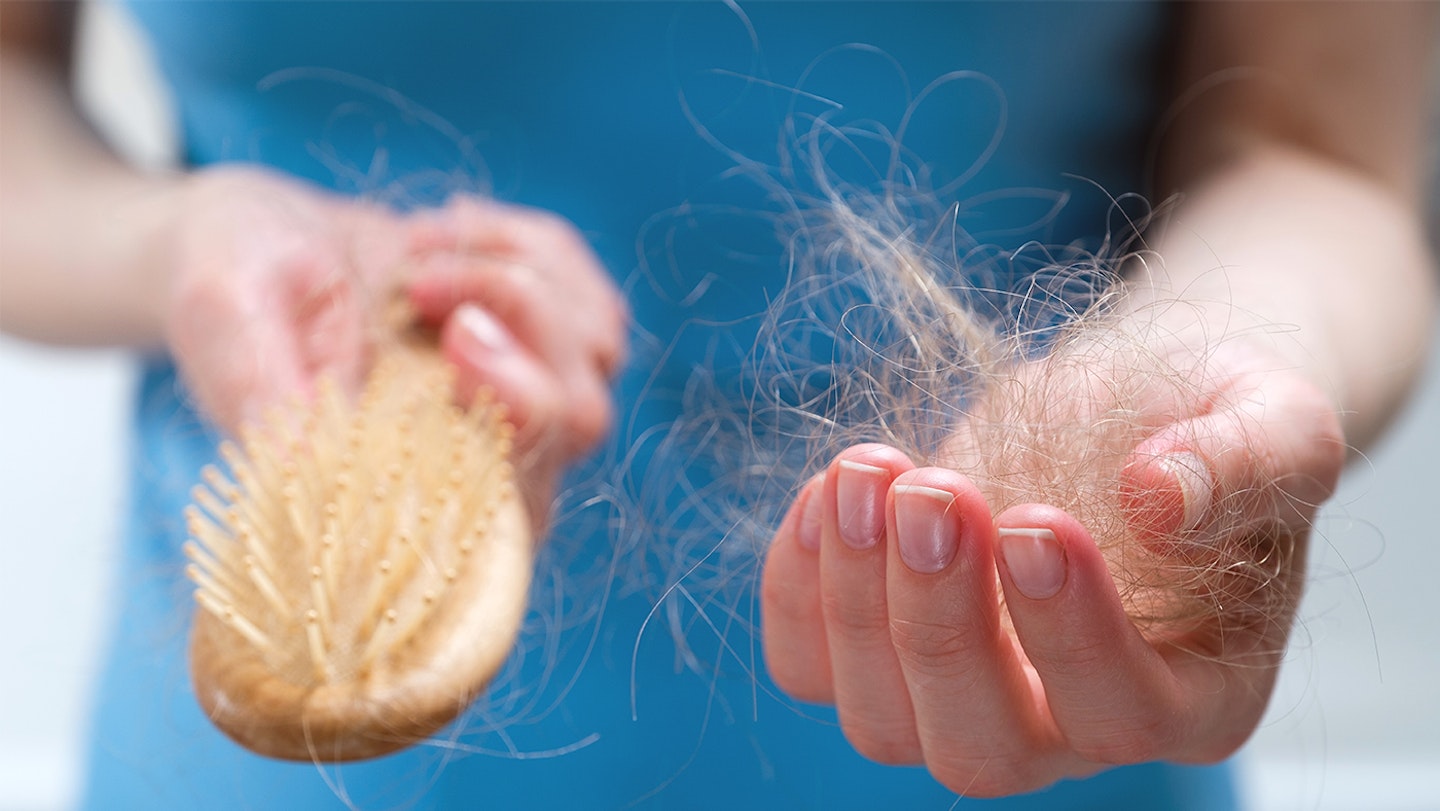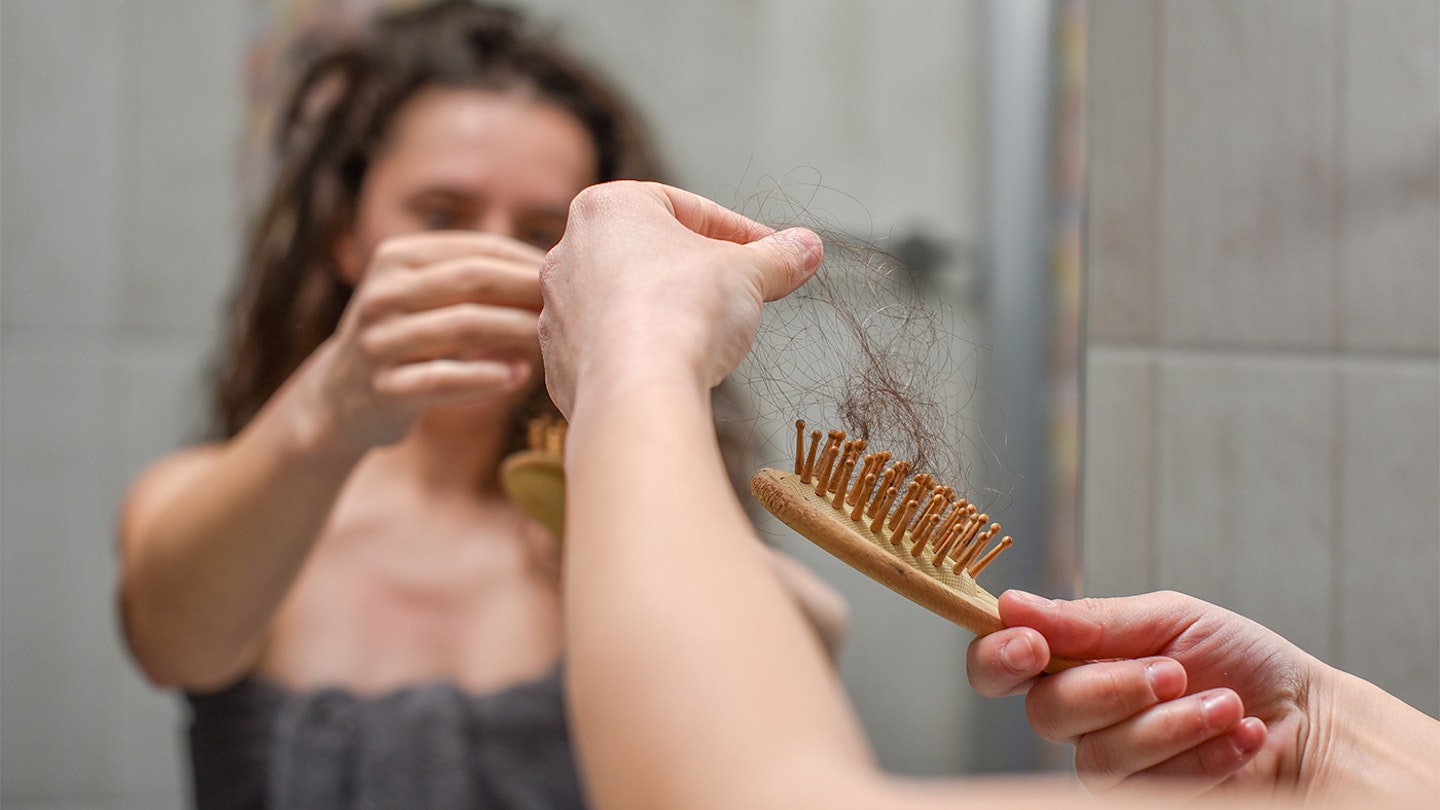You might be surprised to learn that it's normal to lose 50 to 100 hairs per day, but if you're losing any more than that, it could mean your hair is starting to appear thinner, so it's understandable why you might want to invest in some hair growth products for your thinning hair.
Thinning hair doesn't always mean you have bald patches, but it's likely that overall your hair may look sparse in areas. That's why many mature women opt for a stylish shorter hairstyle to give the appearance of thicker hair. Some may also switch to a hair growth shampoo from their regular one too.
As hair thins over time over a very gradual period, you might not notice these changes straight away, so it can be hard to pinpoint exactly what is causing the thinning.
If you've noticed your hair is looking a little thin and you want to try and do something about it, we've rounded up everything to help you learn why your hair is thinning, from the causes, remedies such as hair growth serums and when it might be something to worry about.
What causes thinning hair?
Everyone's hair is different, and your hair type can depend on a number of things including your genetics, diet, lifestyle choices plus how you style your hair. Different medications and medical conditions can also cause thinning of the hair.
Other causes include:
• Over-colouring or perming your hair
• Harsh hair sprays or gels
• Wearing tight hairstyles such as ponytails or buns that tug at your hair root. Instead, opt for a hairstyle that's ideal for thinning hair.
• Stress
• Lack of iron in your diet
• Lack of vitamin D
• Recently had a baby
• Recently stopped hormonal contraception
• Skin disorders
• Experiencing hormonal changes
• Losing a significant amount of weight in a short period
How can thinning hair be treated?
There are many different hair growth products on the market to help combat thinning hair, promote hair growth and make hair appear thicker and healthier in general.
Thickening hair shampoo
When it comes to regrowing your thinning hair, there are many thickening shampoos and shampoos to promote hair growth available on the market. They work to add volume to the hair to help it appear thicker. Many also contain vitamins to help improve your scalp health, which may lead to more hair growth. In some cases, you might be prescribed a prescription strength-thickening hair shampoo or the more natural, organic shampoos for hair lossgrowth may do the trick.
As well as shampoos, conditioners and serums to promote hair growth also make good additions to a hair care routine to combat hair thinning.
Vitamins and supplements
If you struggle to have a balanced diet and consume the best foods for hair growth, it might be worth getting some multivitamins. It might even be worth asking your doctor for a blood test if you think you might have a deficiency.
A daily multivitamin supplement might be a good place to start, but there are extra vitamins and supplements you can buy that support hair growth including:
• Folic acid - great for generating cells
• Vitamin B7 - also known as biotin
• Omega 3 and 6 - great for your skin and fighting inflammation
Scalp massages
Giving yourself a scalp massage can be very relaxing and it won't cost you a penny. It's a nice thing to do when washing your hair in the shower or bath. Apply some pressure to your scalp with your fingertips while you're washing with shampoo, and this will help encourage blood flow around the scalp and is a really relaxing and natural way to make your hair grow faster. You could also use a scalp massage tool if you prefer.
Essential oils
Although there is little evidence to back the effectiveness of essential oils when it comes to hair loss, some swear by lavender oil or rosemary or thyme oil. Just make sure you dilute them and do a patch test before applying to your scalp.
Medication
There are medicated options you can buy for hair loss if the other options aren't working for you.
• Minoxidil -also known as Rogaine, it's an over-the-counter hair loss treatment that's applied to the scalp
• Spironolactone - this might be recommended if your hair loss is down to hormonal reasons
• Finasteride - a pill that men could be prescribed
Can thinning hair grow back?
This depends entirely on the reason why the hair has thinned in the first place. Certain medical conditions mean that it would be difficult for thinning hair to grow back, while those of us who experience thinning hair because of the likes of pregnancy or stress, may experience eventual regrowth.
How to prevent hair loss
If your hair thinning is not related to a medical cause, there are certain steps you can take that may help prevent further hair loss.
Eat a balanced diet
As hair loss can be a result of a lack of micronutrients and macronutrients, examining your diet and what you are eating to ensure you are consuming the right type of foods can be beneficial.
Look after your hair
It sounds obvious but as well as concentrating on your thinning hair, you should be implementing good hair care too. Look at your current hair routine and check your hairbrush is suitable for thinning hair and that your haircare products are gentle enough. You may also wish to consider using non-heated styling tools and ditching any tight hairstyles too.
Reduce stress
Been feeling a bit stressed lately? Researchers have found that stress can cause hair loss as the stress hormone cortisol can disrupt your hair growth cycle. Self-care tips to help reduce stress include nourishing your body, getting outside and journaling.
Stop smoking
We all know that smoking has many negative side effects, but did you know that one of these can also be hair loss? This is believed to be due to the inflammatory effects in the body.
When to see a doctor for thinning hair
You should speak with your doctor if you are losing more than 100 hairs per day and if you are worried about persistent hair loss or patchy hair loss.
It's also worth talking to your doctor before trying any treatments or remedies. Your doctor will also be able to rule out any other underlying cause of your thin hair.

What shampoo should I use for thinning hair?
As discussed, hair thinning can occur for numerous reasons, so you'll most likely need to try various different shampoos until you locate the best one for your needs personally. We'd recommend doing your research into the best hair growth shampoos for women and maybe giving some mini travel sized versions of each shampoo before you buy the larger version.
If you find these still don't work, we'd recommend speaking to your doctor about prescription grade hair growth shampoos that are stronger.
Lorna White is a Senior Digital Writer at Yours.co.uk. She was previously a writer at Yours Magazine writing features and news stories before joining the digital team. Lorna loves the great British countryside and likes to spend her spare time out and about in her home of Nottinghamshire walking her dog, Pippin.

